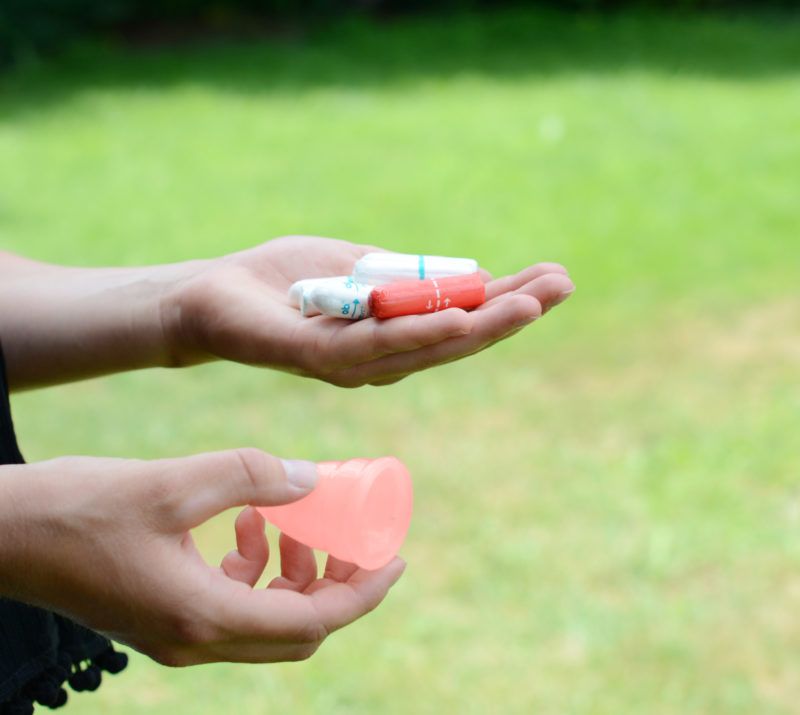How using eco-friendly feminine hygiene products can help you fight plastic pollution

As part of our ongoing ‘Sinner or Binner’ campaign, we’ve talked extensively about how the improper disposal of tampons and sanitary towels is one of the biggest causes of troublesome drain blockages. The reason for this is that many of these products contain hidden plastics that aren’t immediately noticeable or recognisable, but nevertheless prevent the items from being broken down, and turning them into an environmental hazard for our sewers and oceans.
Given that women use around 11,000 disposable menstrual products during their lifetime, this can have a significant negative impact on our drains and our ecosystem if they are not disposed of correctly. According to a survey conducted by Lanes Group, as many as 20 million UK women have wrongly flushed a sanitary product down the toilet in their lifetime, so finding better ways to dispose of these products will help to alleviate this problem – but what if there were also more eco-friendly alternatives out there that could reduce the use of plastic-filled pads and tampons in the first place?
Women have come to rely on the most popular tampon and sanitary towel brands because they seem like the most practical products to use, but in reality there is a growing number of alternatives that are not only more environmentally sound, but also potentially more affordable and comfortable.
Here’s an overview of some of the increasingly popular eco-friendly feminine hygiene products:
Menstrual cups
Menstrual cups have become increasingly popular in recent years, with brands such as Mooncup and Lily Cup among the most prominent examples.
These products take the form of a medical-grade silicone cup that collects the flow of blood, instead of absorbing it like a tampon, meaning it can be easily washed and reused for up to a decade. This long-term reusability will deliver significant savings over time compared to regularly purchasing pads or tampons; moreover, these cups also hold more liquid and can help to reduce the risk of infection associated with more conventional sanitary aids.
It is estimated that for every individual switching to a menstrual cup for ten years, 2,750 fewer sanitary products with hidden plastics would need to be disposed of, meaning the environmental benefit of these products can’t be understated.
Cotton tampons and towels
The reason why conventional sanitary products are so harmful to the environment is that their plastic content is woven into the fabric in order to improve durability, meaning they are no longer biodegradable – in fact, one sanitary towel can contain as much plastic as four carrier bags. This means they will not fully decompose even when disposed of in the bin, let alone when they are incorrectly flushed down the toilet.
As such, a number of companies are launching their own organic cotton tampons and sanitary towels, designed to have minimal impact on the environment, with a wide range now available. These products are the closest alternative to the sanitary products offered by the leading brands, but since they contain no hidden plastics, they will biodegrade fully when thrown away with no adverse environmental impact – assuming they are correctly disposed of in the bin, rather than down the toilet.
Like the most popular sanitary products, cotton tampons and towels come in a huge variety of styles to suit individuals – you can find options that hold different amounts of liquid, for example, or choose whether or not you require a plastic-free applicator.
Period pants and washable pads
Like the menstrual cup, period pants offer significant savings by offering a reusable alternative to the constant cycle of expensive single-use sanitary products that most women currently depend upon.
Washable period pants resemble conventional underwear but come with built-in absorption technology, meaning they essentially function similarly to a sanitary pad. They can be worn for up to eight hours and hold much more liquid than standard tampons and towels, eliminating the need to use plastic products.
Additionally, washable versions of standard sanitary pads are also now widely available. These can be worn inside regular pants and are less expensive than period pants, but still offer the same reusability and cost-saving benefits that other multi-use sanitary products provide.
By swapping single-use sanitary products for some of these plastic-free alternatives, women can massively reduce the volume of plastic that makes its way into our sewers and pollutes the oceans, while also managing their own health and hygiene in a way that’s more convenient and kinder on their wallets.
To find out more about the dangers of hidden plastics and how to avoid them, check out our Hidden Plastic Factfile – and remember to spread the word to your family and friends about the simple yet effective steps we can all take to protect our sewers, oceans and environment. Be a binner, not a sinner!







